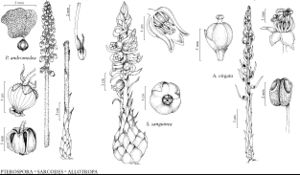Sarcodes
Proc. Amer. Assoc. Advancem. Sci. 4: 193. 1851 ,.
Herbs, achlorophyllous, heterotrophic. Stems absent. Leaves absent. Inflorescences racemes, erect at emergence from soil, axis fleshy and fibrous, persistent after seed dispersal, bright red to dark orange, 2–10 cm diam. proximal to proximalmost flower. Pedicels perpendicular to inflorescence axis, often more erect in fruit; bracteoles absent. Flowers radially symmetric, horizontal; sepals 5, distinct, lanceolate-ovate; petals 5, connate, red, without basal tubercles, (surfaces glabrous), corolla campanulate; intrastaminal nectary disc present; stamens 10, included; filaments broader proximally than distally, glabrous; anthers elongate, without awns, without tubules, dehiscent by 2 terminal, porelike slits; pistil 5-carpellate; ovary 5-locular; placentation axile; style straight, stout; stigma subcapitate, without subtending ring of hairs. Fruits capsular, horizontal to erect, indehiscent to irregularly breaking apart, no cobwebby tissue exposed by splitting valves at dehiscence. Seeds 100+, ovoid, not winged. x = 32.
Distribution
w United States, nw Mexico.
Discussion
Species 1: w United States, nw Mexico.
Species 1
Selected References
None.
